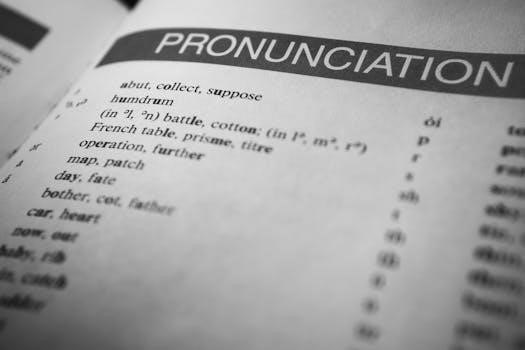Act 1 of Macbeth sets a dark‚ mysterious tone with the witches’ prophecies‚ igniting Macbeth’s ambition. The battle showcases his heroism‚ while King Duncan’s praise and announcement of Malcolm as heir intensify the tension‚ setting the stage for tragedy.
1.1. Setting the Tone: The Opening Scene
The opening scene of Macbeth establishes a dark and mysterious tone through the witches’ gathering amidst thunder and lightning on a Scottish moor. The eerie atmosphere‚ created by the storm and the witches’ chants‚ foreshadows the evil and chaos that will unfold. Their prophecies introduce the central conflict‚ setting Macbeth on a path of ambition and destruction. This scene effectively captivates the audience‚ preparing them for the tragic events driven by fate‚ ambition‚ and the supernatural.
1.2. The Three Witches: Their Role and Significance
The three witches‚ or Weird Sisters‚ play a pivotal role in Macbeth‚ serving as catalysts for the plot’s progression. Their prophecies ignite Macbeth’s ambition‚ while their enigmatic nature and supernatural knowledge create an aura of mystery. They embody fate’s influence‚ challenging Macbeth’s free will and taunting him with visions of power. Their presence also heightens the play’s eerie atmosphere‚ symbolizing the forces of darkness and chaos that drive the tragic events forward. Their significance lies in their ability to provoke and manipulate‚ setting Macbeth on his doomed path.
1.3. The Prophecies: Macbeth’s Destiny Revealed
The three witches’ prophecies in Act 1 unveil Macbeth’s potential future‚ sparking his ambition. They foretell his rise as Thane of Cawdor and eventual king‚ while also prophesizing Banquo’s descendants as future rulers. These predictions create a sense of inevitability‚ shaping Macbeth’s perception of destiny. The prophecies not only ignite his desire for power but also introduce the theme of fate versus free will‚ leaving Macbeth torn between trusting the supernatural predictions or forging his own path.

Scene 1: The Witches’ Prophecy
The scene opens with the three witches chanting on a stormy moor‚ creating an eerie atmosphere. Their cryptic dialogue sets the tone for impending revelations.
2.1. The Weather and Mood: Thunder and Lightning
The scene begins amidst a thunderstorm‚ with flashes of lightning illuminating the dark Scottish moor. The turbulent weather creates an eerie‚ ominous atmosphere‚ signaling impending chaos.
The storm mirrors the witches’ supernatural presence‚ setting a tone of foreboding and instability. The natural turmoil reflects the internal conflict Macbeth will soon face.
This dramatic setting prepares the audience for the prophecies and dark events that will unfold‚ establishing a mood of tension and unpredictability.
2.2. The Witches’ Gathering: A Scottish Moor
The scene unfolds on a desolate Scottish moor‚ a place of isolation and eerie beauty. The witches gather here‚ their presence amplifying the mood of mystery and foreboding.
The moor’s vast‚ empty landscape symbolizes a space where the natural and supernatural collide‚ creating an atmosphere of unpredictability.
This setting marks the intersection of fate and reality‚ preparing the audience for the prophecies that will alter Macbeth’s path and shape the play’s tragic course.
2.3. The Prophecies: Macbeth as King
The witches’ prophecies directly foretell Macbeth’s future‚ declaring him the future King of Scotland. This revelation shocks Macbeth‚ igniting his ambition and planting the seeds of his downfall.
The prophecies also predict Macbeth’s rise to the title of Thane of Cawdor‚ a position he soon gains‚ further convincing him of the witches’ accuracy.
These prophecies set the play’s tragic events in motion‚ driving Macbeth’s desire for power and his eventual decision to commit regicide.

Scene 2: The Battle and King Duncan’s Announcement
Scene 2 opens with a intense battle where Macbeth fights bravely‚ securing victory for King Duncan. Duncan praises Macbeth‚ announcing Malcolm as his heir‚ adding tension.
3.1. The Battle Scene: Macbeth’s Heroism
In Act 1‚ Scene 2‚ Macbeth displays remarkable bravery during the battle‚ leading Scotland to victory against the rebels. His swordsmanship and strategic mind impress King Duncan‚ who praises his valor. Macbeth’s heroic actions earn him the title of Thane of Cawdor‚ showcasing his warrior prowess. This scene establishes Macbeth as a respected and feared military leader‚ setting the stage for his subsequent rise and internal conflict. His heroism highlights his noble qualities‚ contrasting with the darkness that later consumes him.
3.2. King Duncan’s Gratitude: Praise for Macbeth
King Duncan expresses deep gratitude toward Macbeth for his victory in battle‚ hailing him as a “noble Macbeth” and a savior of Scotland. Duncan’s praise highlights Macbeth’s bravery and leadership‚ further elevating his reputation. The king’s admiration serves as a testament to Macbeth’s loyalty and skill‚ reinforcing his noble standing. This recognition plants seeds of ambition in Macbeth‚ setting the stage for his eventual desire for the throne.
3.3. The Announcement: Malcolm as Heir
King Duncan declares Malcolm‚ his eldest son‚ as the rightful heir to the Scottish throne. This announcement‚ while a natural succession‚ inadvertently fuels Macbeth’s growing ambition. The prophecy of the witches‚ which foretold Macbeth’s future kingship‚ now seems thwarted by Duncan’s decision. This moment sparks a internal conflict within Macbeth‚ as he begins to question fate and his own destiny. The announcement sets the stage for the tragic events that will unfold.

Scene 3: The Witches Reappear
The witches encounter Macbeth and Banquo again‚ revealing prophecies about their futures. Macbeth learns of his impending kingship‚ while Banquo hears of his descendants’ royal destiny. This ignites Macbeth’s ambition and growing fear of Banquo as a potential threat‚ further complicating the plot.
4.1. The Witches’ Reunion: Meeting Macbeth and Banquo
The witches reunite with Macbeth and Banquo on a desolate heath‚ creating an eerie atmosphere. They greet Macbeth with ominous titles‚ acknowledging his future as king. Banquo‚ though wary‚ is also addressed‚ as the witches foresee his descendants ruling Scotland. Macbeth‚ eager for clarity‚ presses for more details‚ while Banquo remains cautious‚ questioning the witches’ intentions. This encounter deepens Macbeth’s ambition and sparks Banquo’s curiosity‚ setting the stage for future conflicts and power struggles.
4.2. The Prophecies: Banquo’s Future
The witches reveal to Banquo that his descendants will become kings‚ though he will not reign himself. This prophecy sparks Banquo’s curiosity and skepticism‚ as he struggles to believe the witches’ words. The prediction also plants a seed of tension‚ as Macbeth begins to view Banquo’s lineage as a threat to his own future. This moment highlights the intertwined fates of Macbeth and Banquo‚ setting the stage for later tragedy.
4.3. Macbeth’s Reaction: Ambition Ignited
Macbeth’s ambition is ignited by the witches’ prophecies‚ particularly Banquo’s future. He becomes envious and anxious‚ realizing that Banquo’s descendants may overshadow his own legacy. This revelation fuels Macbeth’s desire for power and accelerates his internal conflict. He begins to question his loyalty to Duncan and contemplates the possibility of seizing the throne. The prophecies not only reveal destiny but also stir Macbeth’s darker impulses‚ setting the stage for his tragic downfall.

Scene 4: Macbeth’s Inner Conflict
Macbeth grapples with ambition and conscience‚ torn between loyalty to Duncan and his desire for the throne. His hesitation reveals deep emotional turmoil and haunting thoughts.
5.1. Macbeth’s Soliloquy: The Seeds of Doubt
Macbeth’s soliloquy in Act 1‚ Scene 4‚ reveals his internal struggle with ambition and morality. He contemplates the consequences of killing Duncan‚ expressing fear of guilt and retribution. His famous lines‚ “Stars‚ hide your fires; / Let not light see light” reflect his desire to conceal his dark intentions. This moment highlights his tragic flaw: the conflict between his conscience and the lure of power‚ setting the stage for his eventual downfall. His hesitation underscores the psychological complexity of his character.
5.2. The Influence of Lady Macbeth: Pushing Macbeth
Lady Macbeth’s influence is pivotal in Act 1‚ as she challenges Macbeth’s hesitation about killing Duncan. She questions his manhood and mocks his fear‚ goading him into action. Her famous line‚ “Unsex me here‚” reveals her ruthless determination. By undermining his doubts‚ she strengthens his resolve‚ shifting the balance of power in their relationship. Her manipulation highlights her dominant role‚ driving Macbeth closer to committing the murder. Her push ignites his ambition‚ making her a catalyst for the tragic events that unfold.
5.3. The Decision: To Kill or Not to Kill
Macbeth’s internal conflict reaches its peak as he debates whether to proceed with Duncan’s murder. His soliloquy reveals a mind torn between ambition and morality. He weighs the potential consequences‚ fearing guilt and the unraveling of his reputation. Despite his reservations‚ Macbeth ultimately resolves to act‚ driven by the desire for power and the fear of appearing cowardly. This pivotal moment showcases his tragic struggle between conscience and ambition‚ setting the stage for the play’s dark events;

Scene 5: Lady Macbeth’s Ambition
Lady Macbeth’s ruthless determination is revealed as she learns of the prophecies. Her ambition drives her to push Macbeth toward murder‚ showcasing her dark resolve.
6.1. Lady Macbeth’s Character: Ruthless Ambition
Lady Macbeth’s character is defined by her unyielding ambition and ruthless determination. She is cunning‚ manipulative‚ and willing to override moral boundaries to achieve power. Unlike Macbeth‚ she shows no hesitation‚ displaying a calculating nature that drives the plot forward. Her infamous invocation of dark spirits highlights her willingness to sacrifice her humanity for power. Lady Macbeth’s ambition is not just personal but also a means to elevate her husband‚ showcasing her complex and formidable personality. Her strength contrasts sharply with Macbeth’s indecision‚ making her a central force in the tragedy.
6.2. The Invocation: Calling on Spirits
Lady Macbeth’s invocation of spirits is a pivotal moment in Act 1‚ showcasing her ruthless ambition. She calls upon dark forces to “unsex” her and fill her with cruelty‚ willing to sacrifice her femininity for power. This act underscores her determination to push Macbeth toward murder. Her plea to be filled with “direst cruelty” highlights her willingness to embrace evil‚ revealing her as a formidable and calculating figure. This moment solidifies her role as the driving force behind the plot’s dark trajectory.
6.3. Lady Macbeth’s Plan: Manipulating Macbeth
Lady Macbeth devises a plan to manipulate Macbeth into committing murder. Upon reading his letter about the prophecies‚ she recognizes his hesitation and resolves to push him toward action. She strategically questions his courage and manhood‚ using guilt and emasculation to propel him forward. Her plan also includes practical steps‚ such as drugging King Duncan’s guards and framing them for the murder. Lady Macbeth’s cunning and determination highlight her role as the driving force behind the plot‚ showcasing her ruthless ambition and ability to manipulate others to achieve her goals.

Scene 6: The Feast and the Murder
The feast masks the tension as Macbeth‚ spurred by Lady Macbeth’s goading‚ commits the regicide‚ setting off a chain of guilt and escalating chaos.
7.1. The Feast: A Night of Celebration
The scene opens with a grand feast at Macbeth’s castle‚ where King Duncan and Scottish nobles gather to celebrate the victory. The atmosphere is merry‚ with music‚ laughter‚ and wine flowing freely. However‚ beneath the surface‚ tension simmers as Macbeth struggles with his dark intentions. Lady Macbeth ensures the king remains unaware of the impending danger‚ maintaining a facade of hospitality. The feast serves as a stark contrast to the evil plot unfolding‚ highlighting the deceptive nature of appearances. The night’s joy masks the horror that is to come.
7.2. Macbeth’s Struggle: The Final Decision
Macbeth’s internal conflict reaches its peak as he grapples with morality and ambition. Torn between loyalty to King Duncan and the temptation of the throne‚ he experiences intense psychological turmoil. The witches’ prophecies and Lady Macbeth’s relentless persuasion weigh heavily on his conscience. Despite his hesitation‚ Macbeth ultimately resolves to commit the murder‚ surrendering to his darker impulses. This moment marks a turning point‚ as his ambition overpowers his ethical reservations‚ setting the course for tragic events. His decision is both a triumph of will and a surrender to darkness.
7.3. The Murder: King Duncan’s Death
The murder of King Duncan is a pivotal moment in Act 1‚ marking the culmination of Macbeth’s internal struggle. Under the cover of darkness‚ Macbeth sneaks into the king’s chamber and commits the deed‚ driven by ambition but haunted by guilt. The act is swift yet deeply unsettling‚ leaving Macbeth shaken. The sound of a faint noise startles him‚ intensifying his paranoia. Duncan’s death sets in motion a chain of events that will forever alter Scotland and Macbeth’s destiny‚ plunging him into a realm of remorse and tyranny.
Scene 7: Aftermath of the Murder
The scene unfolds with chaos and tension as the murder’s consequences emerge. Macbeth and Lady Macbeth confront the aftermath‚ revealing their contrasting reactions to the crime.
8.1. Macbeth’s Guilt: The Consequences of Action
Macbeth‚ overwhelmed by guilt‚ struggles with the moral implications of his actions. Haunted by the memory of Duncan‚ he experiences paranoia and hallucinations‚ such as hearing voices. His conscience torments him‚ revealing the psychological toll of the murder. This internal conflict highlights the destructive nature of unchecked ambition‚ as Macbeth’s mental state begins to unravel. The weight of his guilt sets the stage for further turmoil and tragedy‚ showcasing the devastating consequences of his decision.
8.2. Lady Macbeth’s Reaction: Calm and Calculating
Lady Macbeth‚ unlike her husband‚ initially appears calm and composed after the murder. She shows no visible remorse‚ instead focusing on practical steps to cover their tracks. Her calculating nature is evident as she frames the servants for the crime‚ demonstrating her ability to manipulate situations. However‚ her composure hints at a deeper emotional struggle‚ suggesting that her outward calm may hiding inner turmoil. This contrast between her outward control and potential internal conflict adds depth to her character‚ showcasing her complexity and cunning nature. Her actions highlight her role as a driving force in the plot.
8.3; The Morning After: The Body is Discovered
The morning after the murder‚ Macduff discovers King Duncan’s lifeless body‚ triggering chaos and shock among the thanes. The scene unfolds with Macduff raising the alarm‚ leading to a collective outcry. The discovery accelerates the plot‚ as Macbeth seizes the opportunity to consolidate power. This moment highlights the irreversible consequences of their actions‚ setting the stage for the unfolding tragedy. The reactions of the characters reveal the gravity of the situation‚ while Macbeth’s calculated demeanor further solidifies his transformation.

Character Analysis in Act 1
Macduff finds Duncan’s corpse‚ sparking horror and turmoil. Macbeth manipulates the situation‚ solidifying his power. The discovery accelerates the tragic events‚ revealing the consequences of their actions.
9.1. Macbeth: The Tragic Hero
Macbeth begins as a noble and respected Scottish general‚ earning admiration for his bravery. The witches’ prophecies ignite his ambition‚ revealing a darker side to his character. His internal conflict between loyalty to King Duncan and the lure of power showcases his tragic flaw. Macbeth’s descent from hero to potential murderer highlights Shakespeare’s portrayal of a flawed yet relatable figure‚ whose choices set the stage for his eventual downfall. His complexity makes him a classic tragic hero‚ evoking both empathy and dread as his destiny unfolds.
9.2. Lady Macbeth: The Driving Force
Lady Macbeth is portrayed as a ruthless and ambitious character who pushes Macbeth toward his dark destiny. Her invocation of spirits to strip her of femininity and fill her with cruelty highlights her determination. She manipulates Macbeth‚ challenging his masculinity to overcome his hesitation. Her strength and resolve contrast with Macbeth’s indecision‚ making her the catalyst for the tragic events. Her calm demeanor after the murder further showcases her as the driving force behind their actions‚ revealing a calculating and unyielding nature.
9.3. Banquo: The Loyal Friend
Banquo is portrayed as a loyal and noble friend to Macbeth‚ as well as a fellow general. His skepticism of the witches’ prophecies shows his cautious nature‚ while his concern for Macbeth highlights his loyalty. Banquo’s integrity and commitment to justice are evident‚ as he does not pursue the prophecies for personal gain. His friendship with Macbeth adds depth to their relationship‚ showcasing a bond that contrasts with the darkness unfolding around them.
9.4. King Duncan: The Wise Ruler
King Duncan is depicted as a wise and just ruler‚ beloved by his subjects. His leadership is marked by fairness and gratitude‚ as seen when he praises Macbeth and Banquo for their bravery in battle. Duncan’s decision to name Malcolm as his successor demonstrates his foresight and commitment to Scotland’s stability. His trusting nature‚ however‚ makes him vulnerable to betrayal. Duncan’s reign represents order and harmony‚ contrasting sharply with the chaos that follows his death.

Themes in Act 1
Act 1 explores themes of ambition‚ guilt‚ fate vs. free will‚ and dark imagery‚ setting the tone for Shakespeare’s tragic exploration of human nature and morality.
10.1. Ambition: The Catalyst for Action
Ambition emerges as a central theme in Act 1‚ driving Macbeth and Lady Macbeth to pursue power. The witches’ prophecies ignite Macbeth’s desire for the throne‚ while Lady Macbeth goads him to act. Their shared ambition creates tension‚ as Macbeth struggles with moral hesitation. This theme highlights how excessive ambition can lead to destructive consequences‚ overshadowing loyalty and ethics. Shakespeare uses their actions to explore the darker side of human nature‚ where desire for power overshadows reason and conscience‚ setting the stage for tragedy.
10.2. Guilt: The Weight of Conscience
Guilt emerges as a powerful theme in Act 1‚ shaping the characters’ actions and emotions. Macbeth’s internal conflict after the prophecies reveals his moral awareness‚ while Lady Macbeth’s ruthless determination initially hides her conscience. However‚ the weight of guilt becomes apparent after King Duncan’s murder‚ as Macbeth’s paranoia grows and Lady Macbeth’s mental state deteriorates. Shakespeare illustrates how guilt can consume individuals‚ leading to psychological turmoil and tragic consequences. This theme underscores the moral complexity of the characters and the devastating cost of their choices.
10.3. Fate vs. Free Will: The Prophecies’ Influence
The prophecies from the three witches spark a tension between fate and free will in Act 1. While the prophecies suggest a predetermined future‚ Macbeth and Lady Macbeth actively choose to pursue the throne‚ demonstrating the power of human agency. Shakespeare explores how the belief in fate can influence decisions‚ leading characters to embrace or resist their perceived destinies. This interplay highlights the complexity of human nature‚ where prophecy and personal ambition collide‚ shaping the tragic events of the play.

Motifs in Act 1
Darkness and light symbolize good and evil‚ while nature reflects turmoil. Appearance vs. reality highlights deception‚ showcasing Shakespeare’s use of motifs to enrich the play’s themes.
11.1. Darkness and Light: Symbolism of Good and Evil
In Act 1 of Macbeth‚ darkness and light serve as powerful symbols for good and evil. The witches’ scenes are shrouded in darkness‚ emphasizing their malevolent nature and the chaos they unleash. Conversely‚ light symbolizes virtue‚ as seen in King Duncan’s reign and Macbeth’s initial heroism. The interplay of these motifs foreshadows the moral conflict Macbeth will face‚ as darkness gradually overtakes his light‚ reflecting his descent into evil. This contrast underscores the struggle between righteousness and corruption central to the play.
11.2. Nature: The Storm and the Moor
Nature plays a significant role in Act 1 of Macbeth‚ particularly through the storm and the moor. The stormy weather in the opening scenes creates a tense and ominous atmosphere‚ reflecting the turmoil of the witches’ prophecies. The moor‚ a desolate and wild landscape‚ serves as a backdrop for the witches’ gatherings‚ emphasizing the supernatural and chaotic elements of their predictions. These natural settings symbolize the disruption of order and the impending chaos‚ mirroring the internal and external conflicts that unfold in the play.
11.3. Appearance vs. Reality: Deception and Illusion
In Act 1 of Macbeth‚ the theme of appearance vs. reality is prominent; Characters often hide their true intentions behind deceptive facades. Macbeth‚ for instance‚ appears loyal to King Duncan while secretly harboring ambition. Similarly‚ Lady Macbeth presents herself as strong and resolute but internally grapples with moral conflict. The witches also blur reality with their illusions‚ creating a sense of uncertainty. This contrast highlights the tension between outward appearances and inner truths‚ underscoring the play’s exploration of deception and moral complexity.
Study Questions for Act 1
- How do the witches’ prophecies influence Macbeth’s actions in Act 1?
- What motivates Lady Macbeth to push Macbeth toward murder?
- How does the theme of ambition impact the characters’ decisions?
12.1. What tone do the three witches set at the beginning?
The three witches establish a mysterious and ominous tone through their eerie chants and prophecies. Their gathering amidst thunder and lightning creates an atmosphere of foreboding and supernatural intrigue. The witches’ repetitive phrases and riddles introduce themes of destiny and uncertainty‚ setting a dark and haunting mood that permeates the play. Their presence immediately signals that the natural order will be disrupted‚ foreshadowing the chaos and tragedy that will unfold.
12.2. What is your initial opinion of Macbeth?
Macbeth initially appears as a respected Scottish nobleman and capable military leader‚ celebrated for his bravery in battle. His encounter with the three witches sparks ambition‚ revealing a complex character with both noble qualities and underlying flaws. Macbeth’s soliloquy shows internal conflict‚ indicating moral struggle. His eventual decision to proceed with King Duncan’s murder highlights vulnerability to ambition and external pressures‚ setting the stage for his tragic transformation.
12.3. What do you think of Lady Macbeth’s character?
Lady Macbeth is a complex‚ ambitious‚ and dominant figure who exerts significant influence over her husband. Her ruthless determination and ability to manipulate Macbeth highlight her strong will. However‚ her invocation of dark powers reveals a willingness to abandon morality for power. Despite her tough exterior‚ her fainting at the news of Duncan’s murder suggests underlying vulnerability. Her character represents a blend of strength‚ cunning‚ and emotional depth‚ making her a pivotal force in the play’s dark events.



